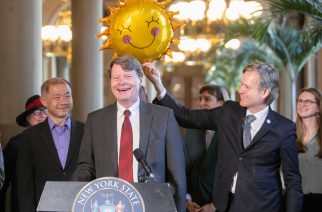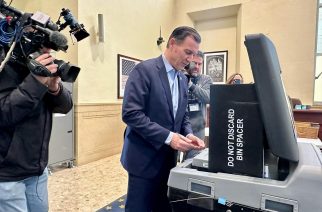
Five of the most influential labor unions in New York are celebrating what could be a short-term victory. The U.S. Supreme Court decision in Friedrichs v. California Teachers Association came down Tuesday to a deadlocked 4-4 vote along liberal and conservative lines. The case threatened to block the ability of public-sector unions from collecting “agency” fees from employees who choose not to join the unions that represent their place of work.
A decision to disallow these fees would have gone against the state law of 23 states and the District of Columbia, reducing the funds for union activities such as lobbying and collective bargaining.
The case is the first decided by the high court since Justice Antonin Scalia’s death, highlighting the effects of decision-making with an incomplete bench.
The split decision preserves organized labor’s ability, for now, to collect agency fees. New York’s chapter of the Civil Service Employees Association emphasized the short term shelf life of this union victory.
“The Friedrichs case is symptomatic of this trend toward a lack of economic fairness and imbalance that is like a cancer on our society,” said CSEA President Danny Donohue. “Friedrichs sought to overturn a long-standing law of the land for the self-interest of some individuals, but only at the expense of the greater community good.”
The litigation was brought to the courts by the Center for Individual Rights, a libertarian group representing the plaintiff teachers. It moved quickly through the court system. and could be heard again when there is a full bench.
“We believe this case is too significant to let a split decision stand and we will file a petition for re-hearing with the Supreme Court,” Terence Pell, president of the CIR, said in a statement
According to the CIR, the plaintiff teachers in the case object to paying fees to a union with whom their political opinions do not align. They claim being forced to fund the union as a condition of employment in a public school is unconstitutional.
The Friedrichs case is not the only challenge to labor unions making its way through the courts. Last year, Illinois Gov. Bruce Rauner issued an executive order banning labor unions from seeking agency fees, citing union participation in politics as a breach of First Amendment rights. In anticipation of legal repercussions, the Rauner filed a federal lawsuit on the issue, hoping to see it brought to the Supreme Court.
Labor unions in New York have come out in support for the ruling, but not forgetting the continuing fight ahead of them.
“The ruling is a defeat for anti-union, conservative forces whose goal is to bankrupt unions and dilute their political influence,” said Frederick Kowal, president of the United University Professions, which represents faculty and stuff on SUNY campuses. “But organized labor cannot rest, knowing full well that the same anti-union factions that brought Friedrichs before the high court have other cases in the pipeline to challenge unions.”
The Friedrichs case, like others against labor unions, have continually been ruled against in lower courts. According to Stephen Madarasz, spokesman for CSEA, “agency fees have been the law of the land for more than 40 years.”
Madarasz says “unbridled greed and self interest” are at the heart of these anti-union cases.
“Attacks on the rights of working people are being funded by the Koch brothers and other corporate entities,” Madarasz said. “It works under the divide and conquer mentality. We need people working together to fight against these attacks.”
The New York Public Employees Federation, representing scientific and technical employees in New York, issued a statement in reaction to this week’s ruling: “While the labor movement in the U.S. is breathing a collective sigh of relief this morning, it doesn’t change the fact that there are more such cases waiting to be heard and threats to unions are still very real.”
Teachers unions in New York warned of the corporate interests threatening the strength of labor unions, and emphasized the Supreme Court’s importance for the rights of all Americans, especially those who work.
“The union victory in the Friedrich’s case demonstrates the critical importance of the Supreme Court,” said Michael Mulgrew, the president of the United Federation of Teachers. “The corporate interests that created and backed the Friedrichs case will continue their efforts to undermine unions, working people, and the country’s middle class.”
“Today’s court ruling is a blow to the corporate, anti-worker groups behind Friedrichs who wish to deny worker the strong voice on the job they need and deserve,” read a statement by New York State United Teachers.









